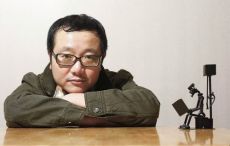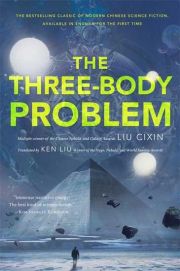Difference between revisions of "Liu Cixin"
imported>Ciic |
imported>Ciic |
||
| (5 intermediate revisions by the same user not shown) | |||
| Line 1: | Line 1: | ||
| − | [[ | + | [[Image:Liu Cixin.JPEG|thumb|230px]] '''Liu Cixin''' ('''刘慈欣''') is a prolific and popular Chinese science-fiction writer. He is the first Asian writer to win the Hugo Awards, an eight-time winner of the Galaxy Award (the Chinese Hugo) and a winner of the Nebula Award. Liu was nominated again in 2017 for ''Death's End'', a third novel in his trilogy ''Remembrance of Earth's Past''. |
| − | '''Liu Cixin''' ('''刘慈欣''') is a prolific and popular Chinese science-fiction writer. He is the first Asian writer to win the Hugo Awards, an eight-time winner of the Galaxy Award (the Chinese Hugo) and a winner of the Nebula Award. | ||
| − | Born in June 1963 in | + | Born in June 1963 in [[Beijing]], Liu graduated from[[North China University of Water Resources and Electric Power]] with a bachelor degree in engineering. He has worked as a computer engineer for a power plant located in a remote village in Yangquan, [[Shanxi province]]. |
| − | + | Liu’s best-seller "[[The Three-Body Problem]]" was published in [[China]] between 2006 and 2010. It was translated into English by [[Ken Liu]] and published by Tor Books in November 2014, and won the 2015 [[Hugo Award]] for Best Novel on August 23, 2015. | |
| − | + | The trilogy, consisting of "Three-Body", "The Dark Forest" and "Death's End," depicts an alien civilization's invasion of Earth during China's [[Cultural Revolution]]. It centers on a secret military project that enables humans to establish contact with the alien civilization teetering on the edge of extinction. | |
| − | + | [[Image:Liu Cixin1.JPEG|thumb|left|180px]] | |
| − | + | The novel series received the [[Chinese Science Fiction Galaxy Award]] in 2006 and 2010, and has been hailed as the best Chinese sci-fi series with over 1 million copies sold in China. | |
| − | + | "The Dark Forest," the second installment of the saga, became available in the United States in August 2015, and translation of the last one, "Death's End," is expected to hit shelves in 2016. | |
| − | + | Known for its brilliant imagination, the book combined the exceedingly ephemeral with hard reality, all the while focusing on revealing the essence and aesthetics of science. It is a distinctly Chinese style of science fiction. | |
| + | Its movie adaptation has completed filming and will hit screen in 2016. | ||
| + | On June 1, 2016, a stage drama based on Liu's best-selling Three-Body trilogy debuted in Shanghai. | ||
| − | [[Category: People]][[Category: | + | [[Category:People]] [[Category:Writers]] [[Category:Literature]] |
Latest revision as of 00:39, 7 April 2017
Liu Cixin (刘慈欣) is a prolific and popular Chinese science-fiction writer. He is the first Asian writer to win the Hugo Awards, an eight-time winner of the Galaxy Award (the Chinese Hugo) and a winner of the Nebula Award. Liu was nominated again in 2017 for Death's End, a third novel in his trilogy Remembrance of Earth's Past.
Born in June 1963 in Beijing, Liu graduated fromNorth China University of Water Resources and Electric Power with a bachelor degree in engineering. He has worked as a computer engineer for a power plant located in a remote village in Yangquan, Shanxi province.
Liu’s best-seller "The Three-Body Problem" was published in China between 2006 and 2010. It was translated into English by Ken Liu and published by Tor Books in November 2014, and won the 2015 Hugo Award for Best Novel on August 23, 2015.
The trilogy, consisting of "Three-Body", "The Dark Forest" and "Death's End," depicts an alien civilization's invasion of Earth during China's Cultural Revolution. It centers on a secret military project that enables humans to establish contact with the alien civilization teetering on the edge of extinction.
The novel series received the Chinese Science Fiction Galaxy Award in 2006 and 2010, and has been hailed as the best Chinese sci-fi series with over 1 million copies sold in China.
"The Dark Forest," the second installment of the saga, became available in the United States in August 2015, and translation of the last one, "Death's End," is expected to hit shelves in 2016.
Known for its brilliant imagination, the book combined the exceedingly ephemeral with hard reality, all the while focusing on revealing the essence and aesthetics of science. It is a distinctly Chinese style of science fiction.
Its movie adaptation has completed filming and will hit screen in 2016.
On June 1, 2016, a stage drama based on Liu's best-selling Three-Body trilogy debuted in Shanghai.

